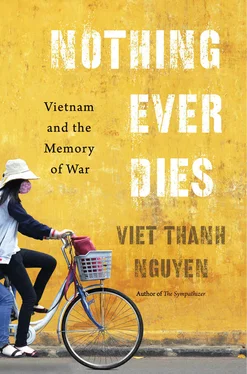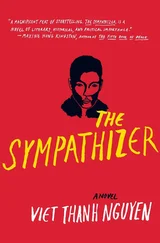27. Panh and Bataille, The Elimination , Kindle edition, loc. 2110.
28. Ibid., loc. 418.
29. Michael Paterniti, “Never Forget,” 9.
30. Panh and Bataille, The Elimination , Kindle edition, loc. 678.
31. Ibid., loc. 3098.
32. Ibid., loc. 1298.
33. Ibid., loc. 2998.
34. Ibid., loc. 3004.
35. Ibid., loc. 2866.
36. Ibid., loc. 2164.
37. Ibid., loc. 1881.
38. Ibid., loc. 928.
39. Ibid., loc. 1736.
40. Ibid., loc. 2195.
41. Ibid., loc. 2202.
42. Dunlop, The Lost Executioner , 23.
43. Sebald quoted in Schwartz, The Emergence of Memory , loc. 591–93.
44. Panh and Bataille, The Elimination , Kindle edition, loc. 1547.
45. Kundera, The Book of Laughter and Forgetting , 85–87.
46. Levinas, Totality and Infinity , 303.
47. Ibid., “the Other is not the incarnation of God, but precisely by his face, in which he is disincarnate, is the manifestation of the height in which God is revealed” (79).
48. Ibid., 261.
49. Ibid., 233.
50. Ibid., 71.
51. Ibid., 51.
4. ON WAR MACHINES
1. Nietzsche, On the Genealogy of Morals , 497.
2. Sebald, On the Natural History of Destruction , 89.
3. Herr, Dispatches , 260.
4. Rowe, “ ‘Bringing It All Back Home,’ ” 197.
5. The album is Rage Against the Machine’s self-titled debut album. The rock star is Dave Navarro of Jane’s Addiction and the Red Hot Chili Peppers. A video of the MTV Cribs episode can be seen on YouTube: https://www.youtube.com/watch?v=OXJVxwAdOUg.
6. Sturken, Tangled Memories , 8.
7. Farocki, Inextinguishable Fire .
8. An account of the work of and difficulties faced by North Vietnamese photographers can be found in Requiem , edited by Faas and Page.
9. Williams, Marxism and Literature , 131–32.
10. Marx and Engels, The German Ideology , 64.
11. On technologies of memory and this war, see Sturken, Tangled Memories , 9–10.
12. Iyer, Video Night in Kathmandu , 3.
13. See “Virtual Reality Exposure Therapy” (no author) and Calverley, “Next Generation War Games.”
14. Bergson, in Matter and Memory , speaks of how “representation is there, but always virtual” (28), while our perceptions are “interlaced with memories” whose existence is implied as virtual, for “a memory … only becomes actual borrowing the body of some perception into which it slips” (72).
15. Makuch, “Destiny Reaches 16 Million Registered Users, Call of Duty Franchise Hits $11 Billion.”
16. See Keen, Empathy and the Novel.
17. Grossman in On Killing lays particular blame on video games for desensitizing children toward violence. His stance of moral outrage at video games obscures the more disturbing reality that it is the war machine that produces video games and which encourages violence in children through a lifetime barrage of messages concerning patriotism, nationalism, the evil of unknowable others, the holiness of the Second Amendment, and so on.
18. Apostol, The Gun Dealers’ Daughter , 122.
19. The evidence of American and other tourist reactions is found in the guest books available in many museums, which invite visitors to record their reactions and sentiments. See Laderman’s Tours of Vietnam for a look at some of these American tourist reactions to the War Remnants Museum.
20. See Becker, “Pilgrimage to My Lai,” for one account of this kind of journey.
21. For accounts of American veterans and their returns to Vietnam, including their encounters with Vietnamese memorials and memories, see Bleakney, Revisiting Vietnam .
22. McCarthy, The Seventeenth Degree , 268.
23. Irwin, “Viet Reparations Ruled Out.”
24. Johnson uses the phrase “empire of bases” several times, as a core concept of his argument, throughout The Sorrows of Empire .
25. Coppola delivered these lines at the Cannes Film Festival in 1979, a moment recorded in his wife Eleanor Coppola’s documentary Hearts of Darkness .
26. Baudrillard, Simulacra and Simulation , 59.
27. Herr, Dispatches , 160
28. Swofford, Jarhead , 6–7.
29. Appy, Patriots , 216.
30. Karlin, Khuê, and Vu, eds., The Other Side of Heaven , 11.
31. Fitzgerald in Fire in the Lake discusses the American military’s use of “Indian country” to describe areas outside of their control, 368.
32. Virilio, War and Cinema , 26.
33. Trinh, “All-Owning Spectatorship.”
34. Espiritu, Body Counts , 83.
35. Chin and Chan, “Racist Love.”
36. “Remarks of Senator John F. Kennedy at the Conference on Vietnam Luncheon in the Hotel Willard, Washington, D.C.”
37. See Kim’s Ends of Empire for an accounting of how Asia and Asian Americans have been shaped by American Cold War conflicts and policies.
38. Baudrillard, Simulacra and Simulation , 60.
5. ON BECOMING HUMAN
1. Cumings’s The Korean War provides the historical information on the war for this chapter.
2. See Gooding-Williams’s edited volume Reading Rodney King, Reading Urban Uprising for more on the events in Los Angeles.
3. For an account of Korean immigrants in Los Angeles, see Abelmann and Lie, Blue Dreams .
4. Jager, “Monumental Histories,” 390.
5. Moon describes militarized modernity thus in relation to South Korea: “The core elements of militarized modernity involved the construction of the Korean nation as the anticommunist self at war with the communist other, the constitution of members of the anticommunist body politic through discipline and physical force, and the intertwining of the industrializing economy with military service. The militarization of national identity as such revolved around the ideologies of anticommunism and national security. In other words, South Korea was founded as an anticommunist nation against the ‘archenemy,’ North Korea. This ideological construction of the nation enabled the modernizing state to deploy disciplinary techniques of surveillance and normalization, as well as institutionalized violence, in its remolding of individuals and social groups. It also resulted in the ascendance of militarized national security over any other sociopolitical issues and justified the construction of the strong modern military and the integration of men’s military service into the organization of the economy” ( Militarized Modernity and Gendered Citizenship in South Korea , 24).
6. Cumings connects Korea’s sanitized memory of the Korean War with its sanitized memory of its role in this war in his article “The Korean War.”
7. See Lee’s “Surrogate Military, Subimperialism, and Masculinity,” 657, for the characterization of South Korea as a subempire. The idea of East Asian nations, particularly Japan, Korea, and Taiwan, as subempires who have a neocolonial relationship with the United States comes from Chen’s Asia as Method .
8. The book was first translated into English in 1994 and then again in 2014, both with the same translator. I cite from the later edition. For more on the significance of this novel, see Hughes’s “Locating the Revolutionary Subject.”
9. Korean names have been romanized in different ways. Hwang Suk-Yong, for example, also appears in different editions or critical discussions as Hwang Suk-Young and Hwang Seok-young. I follow the romanization of author, director, and character names according to the way they appear in the editions of the texts, covers, and movies I cite.
Читать дальше












